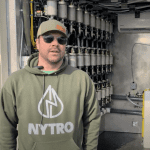The Alberta advantage isn’t just about oil.
For Radient Technologies, it means better access to funding, nearby sources of agricultural biomass, and joining a developed sector of bio-based companies. Founded in Toronto in 2001, the now Edmonton-based company has developed a new, faster way to extract high-value natural compounds from plant biomasses.
Using a microwave-assisted process, it can extract valuable material from flax, rosemary, berries, algae and other types of biomass. For example, it can process flax that has already had the oil extracted.
“We’ll take that from an almost waste stream, extract further actives from that and then put that spent biomass back for use either as a fuel or an animal feed,” said founder Steven Splinter, who is also the company’s chief technology officer.
Read Also

Farming Smarter receives financial boost from Alberta government for potato research
Farming Smarter near Lethbridge got a boost to its research equipment, thanks to the Alberta government’s increase in funding for research associations.
“We’re working with local groups, and will even potentially look at growing specific biomasses for specific actives. We understand that we will have to have a commitment to Alberta agriculture for sure, and we’re prepared to do that.”
- From the Manitoba Co-operator: Straw to be turned into power
The exact list of products isn’t made public for commercial reasons, but the company can process up to five tonnes of biomass a day in its new 20,000-square-foot manufacturing facility. The extracts it produces can be used as nutraceuticals and food additives in natural health products, pharmaceuticals, and cosmetic ingredients. Its customers range from big multinationals to smaller companies developing new and innovative products, said Splinter.
“We’re really a business-to-business group, so we’re not selling locally and will not brand and sell our own products,” said Splinter.
While extraction has been done for centuries, using microwaves reduces processing time and costs while also producing purer compounds, higher yields, and different extract profiles.
“It’s also environmentally friendly because you extract quickly, use less solvent and less energy and you’re reducing greenhouse gas emissions,” said Splinter.
The company made its way to Edmonton in 2009 and recently began trading on the TSX Venture Exchange after raising $14 million from investors.
Companies like Radient are good for Canada, Mike Raymont, CEO of venture capital firm AVAC, said at the official opening of the plant earlier this month.
“Canada has actually run a deficit in processed foods, not in the whole agricultural area, but in upgraded food, in value added, where the money really is,” said Raymont.
“The situation is getting worse. In the last seven years, the deficit in processed foods in Canada has gone from a billion dollars to $6.7 billion. We have to reverse this trend, and we can’t be left to export just raw materials.”
















